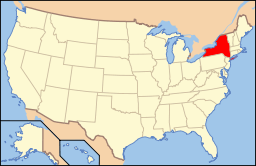90 Church Street
|
90 Church Street (U.S. Post Office – Church Street Station) | |
|
90 Church Street in 2009 | |
   | |
| Location |
90 Church Street Manhattan, New York City |
|---|---|
| Coordinates | 40°42′44.95″N 74°0′40.44″W / 40.7124861°N 74.0112333°WCoordinates: 40°42′44.95″N 74°0′40.44″W / 40.7124861°N 74.0112333°W |
| Built | 1934–35 |
| Architect |
Cross and Cross Pennington, Lewis & Mills Lewis A. Simon (Superv. Arch. of the Treasury) |
| Architectural style | Classical Revival and Art Deco |
| MPS | US Post Offices in New York State, 1858-1943, TR |
| NRHP Reference # | 88002359 [1] |
| Added to NRHP | May 11, 1989 |

90 Church Street is a federal office building in Manhattan, New York City, New York, U.S. The building operates as the United States Postal Service's Church Street Station, which is responsible for the 10048 and 10007 ZIP codes. The building takes up a full block between Church Street and West Broadway and between Vesey and Barclay Streets in the Tribeca neighborhood of Manhattan. The AIA Guide to New York City says about the building: "A boring limestone monolith that has trouble deciding between a heritage of stripped down neo-Classical and a new breath of Art Deco."[2]
History
90 Church Street was designed by Cross & Cross, Pennington, Lewis & Mills and Louis A. Simon, who was Supervising Architect of the Department of the Treasury at the time.[2] The architectural style of the building is a mixture of Neo-classicism and Art Deco. It has two towers and the facade is clad in limestone.[2]
The building was completed in 1935, boasting the art deco style of its day.
It was added to the National Register of Historic Places by the City of New York in 1989.[3][4]
In addition to housing the Postal Service, the 90 Church Street building contains offices of the New York State Public Service Commission, the New York State Health Department, and the New York City Housing Authority.[4]
September 11 attacks
The building suffered moderate damage during the September 11 attacks due to a remnant of one of the planes and other debris landing on top of the building. Following the collapse of the World Trade Centers twin towers, the building's facade was damaged, windows were broken, the roof was seriously burned and major water damage occurred throughout the internal structure. It was also extensively contaminated with asbestos, lead dust, fungi, fiberglass dust, mercury, and bacteria.[4] The building was entirely engulfed by dust after the collapse of both buildings, respectively, and was further damaged when Building 7 collapsed later the same day. There was no major structural damage.[5] During recovery efforts at Ground Zero, the United States Postal Service worked to return individual pieces of mail found by rescue workers to the addressees.[6] In August 2004, the Church Street Station Post Office reopened, and mail was once again being processed there.[7] Church Street Station also serves the 10007 ZIP code, covering portions of Battery Park City, TriBeCa, and the area surrounding New York City Hall.
References
Notes
- ↑ National Park Service (2006-03-15). "National Register Information System". National Register of Historic Places. National Park Service.
- 1 2 3 White, Norval; Willensky, Elliot & Leadon, Fran (2010), AIA Guide to New York City (5th ed.), New York: Oxford University Press, ISBN 9780195383867, p. 72-72
- ↑ Gobrecht, Larry E. (November 1986). "National Register of Historic Places Registration: Church Street Station Post Office". New York State Office of Parks, Recreation and Historic Preservation. Retrieved 2010-10-01. See also: "Accompanying nine photos".
- 1 2 3 Dunlap, David W. (2004-08-19). "Post Office, Polluted on Sept. 11, Is Back in Business". The New York Times.
- ↑ FEMA (May 2002). "Chapter 7, Peripheral Buildings". World Trade Center Building Performance Study (PDF).
- ↑ "Letter to customers explaining recovered 9/11 mail". National Postal Museum.
- ↑ Barr, Meghan (2006-12-04). "Mail Still Being Sent to Trade Center". Associated Press.
External links
![]() Media related to 90 Church Street at Wikimedia Commons
Media related to 90 Church Street at Wikimedia Commons


